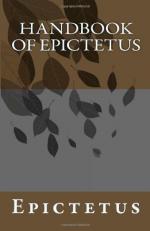|
This section contains 1,252 words (approx. 5 pages at 300 words per page) |

|
Epictetus became a slave of Epaphroditus, himself a freedman who was secretary to Nero. After being freed by his master, Epictetus studied with the Stoic Musonius Rufus, and he taught in Rome until Domitian banished the philosophers in 89 CE. He then established a school in Nicopolis in Epirus, a town in northwest Greece founded by Octavian to commemorate his victory at Actium. Epictetus was lame, perhaps because of his sufferings as a slave, but was a renowned teacher.
Like Socrates, Epictetus wrote nothing, but his pupil Arrian compiled a record of his oral teachings. Four books of these Discourses survive, together with a digest of central points known as the Manual. Although these works reveal that Epictetus taught his students through the careful study of Stoic doctrine (II 13.21, III 16.9–10), they also make it plain that the goal of philosophical learning is not...
|
This section contains 1,252 words (approx. 5 pages at 300 words per page) |

|


